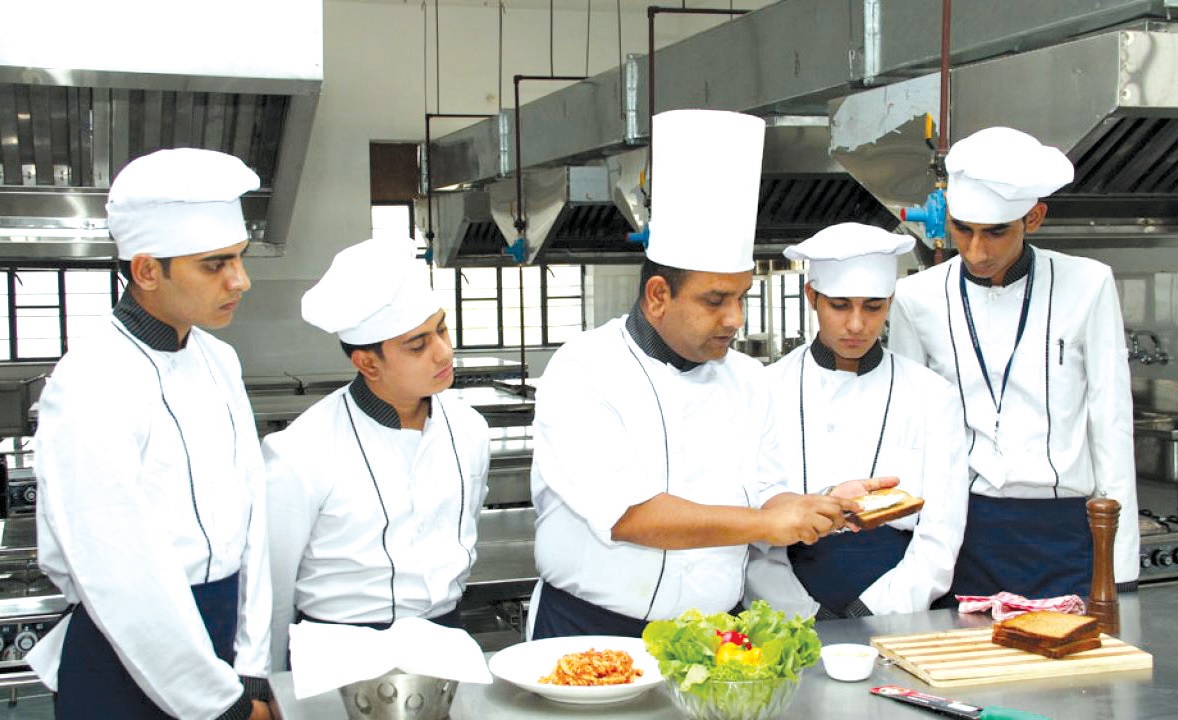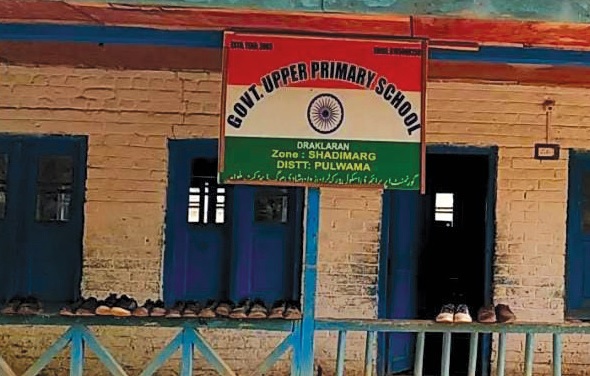The tourism and hospitality sector in India as well as in J&K is growing successively and with it, the demand in the growth of the hotel industry. The scope of pursuing education in hotel management has become more beneficial for students than before, and is one of the top preferences of students, nowadays.
Hotel management course help students cover different aspects of a running hotel or hospitality service such as sales and marketing, food and beverage, front office, accounting, food production, housekeeping and several kitchen skills.
In Jammu and Kashmir, Institute of Hotel Management in Rajbagh, Srinagar is the only government institute that offers BSC degree in Hospitality & Hotel Administration, a three year course with the annual intake of 162 students.
The institute was established in 1982.It is affiliated with Nation Council for Hotel Management and Catering Technology, an autonomous body under the Ministry of Tourism, Government of India.
“In BSC course, a student takes admission at all India level. Students get college as per their rank. The eligibility for admission is 55 percent marks in 12th class examination,” said Muhammad Yaseen Reshi, a lecturer at the institute.
Students spent first and second semester in college and in the third semester one batch is sent for the internship in hotels. “We have 100 percent placement and the college arranges the internship for the students,” he said.
During the internships, students are also sent outside Jammu and Kashmir to take training in the best five star hotels of the country.
Reshi, who is also a chef, said there are four core areas of hotel management: food production, front office, housekeeping and food and beverage service. He said students get placed in any of the four departments as per their interest.
The institute also offers one and a half year diploma courses in which 6 months training and internships are also included. It has four major diploma courses that include food production, front office, housekeeping and food and beverage service and all of these four subjects have an annual intake of 120 seats.
“Diploma courses are an exclusive course if students are interested in kitchen. Students spent 12 months in college and for rest of the time they go for industrial internships and training. After the internship, they get placement through the institute,” he said.
He said hospitality sector has a future and it is an ever green industry. “As long as people are travelling and staying in hotels, restaurants and serving food, there is no recession of this industry,” he said.
The students of hotel management institute have shined at local, national and international level as its pass out students work in Saudi Airlines, New Zealand, Maldives and other cities.
“Our students have been working in major hotels in India. Many are working as ground staff in airlines. We have male and female students working as cabin crews,” he said.
Reshi said that apart from the two courses there are also many schemes run by the Ministry of Tourism, Government of India.
“There are skill sharpening/enhancement schemes where we send the faculty to the hotels restaurants and they provide on job training to the employees in order to enhance their skills. The duration of this course is one week to 20 days,” he said.
The institute also offers another course under Hunar Se Rozgar Tak (HSRT) program where in students are provided stipend, training, books and uniform and placement after the completion of the course. The course is conducted in food production (kitchen), food and beverage service.
The Ministry of Tourism launched HSRT in the year 2009-10 for creation of employable skills among youth. The initiative is fully funded by the Ministry of Tourism.
“Under the HSRT we have set up satellite training camps in rural areas or near the borders in Uri, Baramulla, Kupwara and other areas. We go there and setup kitchens and we train the local interested students or those people associated with hospitality sector,” he said.
There are also food craft institutes in Jammu which offer only diploma courses not degree.
Reshi said that the best part of the hotel and hospitality industry is that one is exposed to different types of cultures and get an opportunity to learn more.
“The best thing about hotel management is that if you are there for five or six years, you can set up your own enterprise or open a hotel or restaurant which can create jobs for others as well,” he said.
With globalisation and new technologies, the Travel and Tourism Management industry, has become one of the fastest-growing sectors offering scores of employment opportunities.
Dr Parvinder Singh Bali, a corporate chef at The Oberoi Centre of Learning and Development (OCLD), The Oberoi hotel chain said in past hotel management career option was not considered to be a good choice. “Today because of the social media and celebrity chefs and also the rise in tourism and opening up of the new hotels has made this career choice promising for youngsters,” he said.
He said there are many private and government run institutes of hotel management that offer courses in hospitality management, hotel administration and culinary arts.
There are three kinds of hotel management institutes that are operated in India.One come under the banner of National Council which is a part of ministry of tourism; second is National Council Institute of Hotel Management which is in every state,commonly known as IHM.Third ones are state run institutes of hotel management which are run by the state governments.
There is another category of Progressive Institute of Hotel Management (PIHM) which are the private institutions which are linked to or affiliated to the National Council.
Apart from these three categories there are also private institute of hotel management all across the country that offer diploma and a degree program in regular hotel management masters of hospitality administration and a 4-year degree program in culinary arts.
Some of the well-known private institutions such as International Institute of Hotel Management (IIHM) is in various states of India, Welcome Group School of Hotel Management (WGSHA) in Manipal, Symbiosis School of Culinary Arts in Pune, Christ Institute of Hotel Management in Bangalore, Lovely Professional University in Jalandhar, Chitkara University in Punjab are few of the famous private colleges in India offering hotel management.
“Hotel management is the most sought after program that interest today’s generation. Due to the inflow of both domestic and international tourism in India many new hotels resorts have created multi-fold opportunities for the tourism sector,” Dr Parvinder said adding that more and more job opportunities are being created in this industry.
“This industry also is helping the youngsters to connect with the famous personalities and also many shares have the opportunity to become celebrities and TV presenters,” he said.
Dr Parvinder said hotel management graduates, especially those who have a flair for culinary art and have a good personality, have a new avenue open to them.
“There are immense opportunities in the field of food entertainment today. As celebrity chefs, food vloggers and bloggers, there are openings for food photographers, videographers, producers and directors of food shows,” he said.
He said hospitality industry is a people’s industry and it is very important for a person to have excellent interpersonal skills.
“This industry also demands long working hours and passion for service. Excellent attitude knowledge and skills are required to excel in this industry. Inspiring hotel management candidate could be from any field such as science humanity or commerce,” he said.
The Globally acclaimed Kashmiri chef said any hotel management institute is a blend of theoretical and practical exposure to the students in the industry.
“Students learn about diverse cultures and how to communicate effectively with people from various cultures and social backgrounds. It is one of the very unique industries which train youngsters to socialize and look after the guests. That is the reason why the person staying in the hotel is not referred to as a customer but is always referred to as a guest,” he said.










